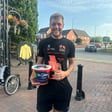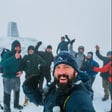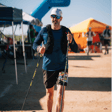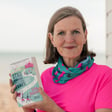
Steve Edwards | 1000 Marathons World Record
On Monday May 6th at the UK Milton Keynes marathon, British runner Steve Edwards achieved what many people have described as the ultimate multi marathon world record when he was crowned the new GUINNESS WORLD RECORDS™ title holder for running 1000 official marathon races in the fastest average finish time.
Listen to this episode to hear Michelle and Steve chat all about what has been a 43 year journey!
A few stats
1000 Official Marathon Races from 1981 - 2024.
Finish Times ranging from 2hrs 51min - 3hrs 57min.
325 Sub 3:15s, 500 sub 3:20s, 801 sub 3:30s & 1000 sub 4,00s
A marathon on average every 13 days for the last 36 years.
First 500 marathons - 22 years - aged 25-45
Average finish time - 3hrs 18min.
Second 500 marathons - 14 years - aged 45 - 61
Average finish time - 3hrs 24min.
Total Average Finish Time for all 1000 marathons - 3hrs 21min 47sec
You can follow Steve on Instagram here



















